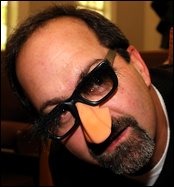Plagiarism Defined
I find it interesting that no one from the Federal Vision camp has stepped forward to defend Steven “Machen” Wilkins. Nevertheless, some might find it helpful to consider the definition of “plagiarism” as defined by his alma maters. According to Auburn Avenue’s website,
Steve Wilkins holds a Bachelor of Science degree (in Pre-Law) from the University of Alabama and a Masters of Divinity from the Reformed Theological Seminary of Jackson, Mississippi. He has been an ordained minister in the Presbyterian Church in America since 1976.
The “Code of Academic Conduct” for the University of Alabama states:
Plagiarism
The Code of Academic Conduct in the University of Alabama Undergraduate Catalog defines plagiarism and other acts of academic dishonesty as follows:
- Plagiarism: representing the words, data, works, ideas, computer programs or output, or anything not generated in an authorized fashion, as one’s own
- Cheating: using or attempting to use unauthorized materials, information, study aids, or computer-related information
- Fabrication: presenting as genuine any invented or falsified citation or material
Although authors occasionally indulge in plagiarism intentionally, most often writers plagiarize unintentionally. Many do not realize that indirect quotations, which result from paraphrasing and summarizing material, also require acknowledgment of the author and the source of the idea.
- Misrepresentation: falsifying, altering, or misstating the contents of documents or other materials related to academic matters, including schedules, prerequisites, and transcripts.
A direct quotation of an author’s exact words is the only footnoted material that requires the use of quotation marks, but both direct and indirect quotations must be footnoted. Any idea or statement that is not the author’s own must be documented.
Remember — the following require the use of a citation:
- Any material directly quoted from another’s work
- Any information that is summarized or paraphrased
- Any idea derived from a known source
Material that is common or general knowledge does not have to be footnoted, unless the wording is taken directly from a particular source. A general rule is that if a fact can be found in five or more sources, it is considered to be common knowledge and does not have to be documented.
- Any fact or data that is not common knowledge and is borrowed from another’s work
Anthony C. Winkler
And the Student Handbook for Reformed Theological Seminary states,
Plagiarism. Research papers require borrowing other people’s ideas and words. However, the source of such borrowing must be acknowledged properly. If the source is not acknowledged properly, your work is plagiarism. At issue is your academic honesty.I invite Mr. Wilkins to utilize his pre-law degree and defend himself.Plagiarism includes word-for-word copying, lifting terms, restatement of someone’s argument or line of thought, copying what the writer of Ten Steps in Writing the Research Paper calls “perfect phrases” — all without acknowledgment of source. Plagiarism also includes giving a source partial credit when more is taken from that source than indicated and quoting or paraphrasing in patchwork fashion. . . .
- The MLA Handbook for Writers of Research Papers says “to plagiarize is to give the impression that you have written or thought something that you have in fact borrowed from someone else.”
- Webster’s Ninth New Collegiate Dictionary defines plagiarize as “to steal and pass off (the ideas or words of another) as one’s own; use (a created production) without crediting the source; to commit literary theft: present as new and original an idea or product derived from an existing source.”
Plagiarism, whether intentional or unintentional, is considered academic theft. When discovered, it results in loss of reputation or position and other punishments. The academic consequences of plagiarism at RTS are as follows:
- First offense: The student must rewrite the paper and receive no better than a passing “D” grade for it.
- Second offense: The student fails the entire course.
Thank you.
































2 comments:
Actually, the more SW appropriates the words of others, the less we have to endure his own drivel. Consider his recent posts on The Avenue (the quality of the posts is consistent with that of the titles...lame:
"Oh yeah? so?"
"Yeah, this too"
"Wowsers with jeepers on top"
"Tired of me"
"Happy anniversary to Gone with the Wind"
"Well, whatcha know"
"No. Don’t tell me this"
And a personal favorite: "To whom it may concern" has to do with a dog owner who regularly allows his pet to poop on SW's lawn. Wonderful stuff for a church blog, don't you think?
Why do I read this stuff?
Anon,
I surfed Wilkins’ blog for about an hour and a half last Sunday; I hadn’t been there since it opened and I wasn’t trolling so much as trying to get a feel. The headlines and posts that you note all grabbed me in the sense of “He’s trying to imitate Wilson with neither the wit nor the content.” He’s not funny; he’s not clever; and he’s not insightful. He left me with the distinct impression that he’s an empty shell of a person who is so shallow that he can’t even offer substantial mockery.
If you ask me, someone should find that dog and reward him.
Post a Comment